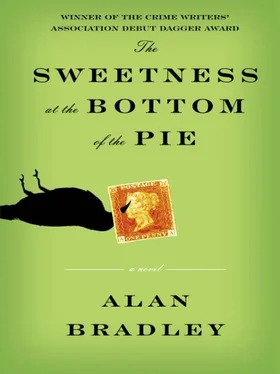Alan Bradley - The Sweetness at the Bottom of the Pie
Здесь есть возможность читать онлайн «Alan Bradley - The Sweetness at the Bottom of the Pie» весь текст электронной книги совершенно бесплатно (целиком полную версию без сокращений). В некоторых случаях можно слушать аудио, скачать через торрент в формате fb2 и присутствует краткое содержание. Жанр: Старинная литература, на английском языке. Описание произведения, (предисловие) а так же отзывы посетителей доступны на портале библиотеки ЛибКат.
- Название:The Sweetness at the Bottom of the Pie
- Автор:
- Жанр:
- Год:неизвестен
- ISBN:нет данных
- Рейтинг книги:3 / 5. Голосов: 1
-
Избранное:Добавить в избранное
- Отзывы:
-
Ваша оценка:
- 60
- 1
- 2
- 3
- 4
- 5
The Sweetness at the Bottom of the Pie: краткое содержание, описание и аннотация
Предлагаем к чтению аннотацию, описание, краткое содержание или предисловие (зависит от того, что написал сам автор книги «The Sweetness at the Bottom of the Pie»). Если вы не нашли необходимую информацию о книге — напишите в комментариях, мы постараемся отыскать её.
The Sweetness at the Bottom of the Pie — читать онлайн бесплатно полную книгу (весь текст) целиком
Ниже представлен текст книги, разбитый по страницам. Система сохранения места последней прочитанной страницы, позволяет с удобством читать онлайн бесплатно книгу «The Sweetness at the Bottom of the Pie», без необходимости каждый раз заново искать на чём Вы остановились. Поставьте закладку, и сможете в любой момент перейти на страницу, на которой закончили чтение.
Интервал:
Закладка:
Father went on as if there had been no interruption.
"We became rather strangers, Bony and I," he said. "Al though we continued as members of Mr. Twining's Magic Circle, each of us pursued his own particular interests. I developed a passion for the great stage tricks: sawing a lady in half, vanishing a cage of singing canaries, that sort of thing. Of course, most of these effects were beyond my schoolboy budget, but as time went on, it seemed enough simply to read about them and learn how each one was executed.
"Bony, however, progressed to tricks which required an ever-greater degree of manual dexterity: simple effects which could be done under the spectator's nose with a minimal amount of gadgetry. He could make a nickel-plated alarm clock disappear from one hand and appear in the other before your very eyes. He never would show me how it was done.
"It was about that time that Mr. Twining had the idea of organizing a Philatelic Society, another of his great enthusiasms. He felt that in learning to collect, catalogue, and mount postage stamps from round the world, we would learn a great deal about history, geography, and neatness, to say nothing of the fact that regular discussions would promote confidence among the more shy members of the club. And since he was himself a devoted collector, he saw no reason why every one of his boys should be any less enthusiastic.
"His own collection was the eighth wonder of the world, or so it seemed to me. He specialized in British stamps, with particular attention to color variations in the printing inks. He had the uncanny ability of being able to deduce the day—sometimes the very hour—a given specimen was printed. By comparing the ever-changing microscopic cracks and variations produced by wear and stress upon the engraved printing plates, he was able to deduce an astonishing amount of detail.
"The leaves of his albums were masterpieces. The colors! And the way in which they ranged across the page, each one a dab from the palette of a Turner.
"They began, of course, with the black issues of 1840. But soon the black warms to brown, the brown to red, the red to orange, the orange to bright carmine; on to indigo, and Venetian red—a bright blossoming of color, as if to paint the bursting into bloom of the Empire itself. There's glory for you!"
I had never seen Father so alive. He was suddenly a schoolboy again, his face transformed, and shining like a polished apple.
But those words about glory: Hadn't I heard them before? Weren't they the ones spoken to Alice by Humpty Dumpty?
I sat quietly, trying to work out the connections his mind must be making.
"For all that," he went on, "Mr. Twining was not in possession of the most valuable philatelic collection at Greyminster. That honor belonged to Dr. Kissing, whose collection, although not extensive, was choice—perhaps even priceless.
"Dr. Kissing was not, as one might expect of the head of one of our great public schools, a man born either to wealth or to privilege. He was orphaned at birth and brought up by his grandfather, a bell-foundry worker in London's East End which, in those days, was better known for its crushing living conditions than for its charity, and for its crime rather than its educational opportunities.
"When he was forty-eight, the grandfather lost his right arm in a ghastly accident involving molten metal. Now no longer able to work at his trade, there was nothing for it but take to the streets as a beggar; a predicament in which he remained sunk for nearly three years.
"Five years earlier, in 1840, the London firm of Messrs. Perkins, Bacon and Petch had been appointed by the Lords of the Treasury as the sole printers of British postage stamps.
"Business prospered. In the first twelve years alone of their appointment some two billion stamps were printed, most of which eventually found their way into the dustbins of the world. Even Charles Dickens referred to their prodigious output of Queens' heads.
"Happily it was in the Fleet Street printing plant of this very firm that Dr. Kissing's grandfather found employment at last—as a sweeper. He taught himself to push a broom with one hand better than most men did with two, and because he was a firm believer in deference, punctuality, and reliability, he soon found himself one of the firm's most valued employees. Indeed, Dr. Kissing himself once told me that the senior partner, old Joshua Butters Bacon himself, always called his grandfather 'Ringer' out of respect to his former trade.
"When Dr. Kissing was still a child, his grandfather often brought home stamps that had been rejected and discarded because of irregularities in printing. These 'pretty bits of paper,' as he called them, were often his only playthings. He would spend hours arranging and rearranging the colorful scraps by shade, by variation too subtle for the human eye unaided. His greatest gift, he said, was a magnifying glass, which his grandfather bargained away from a street-seller after pawning his own mother's wedding ring for a shilling.
"Each day, on his way to and from the board school, the boy called upon as many shops and offices as he was able, offering to sweep their pavements clear of rubbish in exchange for the stamped envelopes from their wastepaper baskets.
"In time, those pretty bits of paper became the nucleus of a collection which was to be the envy of Royalty, and even when he had risen to become headmaster of Greyminster, he still possessed the little magnifying glass his grandfather had given him.
"'Simple pleasures are best,' he used to tell us.
"The young Kissing built upon the tenacity with which life had favored him as a boy and went on from scholarship to scholarship, until there came the day when old 'Ringer' was on hand in tears to see his grandson graduate with a double first at Oxford.
"Now, there is a belief among those who should know better, that the rarest of postage stamps are those freaks and mutilations that are inevitably produced as by-products of the printing process, but this is simply not so. No matter what sums such monstrosities might fetch if they are leaked upon the market, to the true collector they are never more than salvage.
"No, the real scarcities are those stamps which have been put into official circulation, legitimately or otherwise, but in very limited numbers. Sometimes a few thousand stamps may be released before a problem is noticed; sometimes a few hundred, as is the case when a single sheet manages to effect its escape from the Treasury.
"But in the entire history of the British Post Office, there has been one occasion—and one occasion only—when a single sheet of stamps was so dramatically different from its millions of fellows. This is how it came about.
"In June of 1840, a crazy potboy named Edward Oxford had fired two pistols at nearly point-blank range at Queen Victoria and Prince Albert as they rode in an open carriage. Mercifully, both shots missed their target, and the Queen, who was then four months pregnant with her first child, was unharmed.
"The attempted assassination was thought by some to be a Chartist plot, while others believed it to be a conspiracy of Orangemen who wished to set the Duke of Cumberland upon the throne of England. There was more truth in the latter than the government believed, or perhaps than they were prepared to admit. Although Oxford would pay for his crime by spending the next twenty-seven years of his life confined to Bedlam—where he seemed more sane than most of the inhabitants and many of the doctors—his handlers would remain at large, invisible in the metropolis. They had other hares to run.
"In the autumn of 1840, an apprentice pressman named Jacob Tingle was employed at the firm of Perkins, Bacon and Petch. Because he was, above all else, a creature of ambition, young Jacob was soon progressing in his trade by leaps and bounds.
Читать дальшеИнтервал:
Закладка:
Похожие книги на «The Sweetness at the Bottom of the Pie»
Представляем Вашему вниманию похожие книги на «The Sweetness at the Bottom of the Pie» списком для выбора. Мы отобрали схожую по названию и смыслу литературу в надежде предоставить читателям больше вариантов отыскать новые, интересные, ещё непрочитанные произведения.
Обсуждение, отзывы о книге «The Sweetness at the Bottom of the Pie» и просто собственные мнения читателей. Оставьте ваши комментарии, напишите, что Вы думаете о произведении, его смысле или главных героях. Укажите что конкретно понравилось, а что нет, и почему Вы так считаете.












